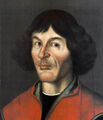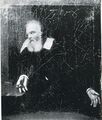|
|
| (28 intermediate revisions by the same user not shown) |
| Line 2: |
Line 2: |
| File:Nikolaus Kopernikus.jpg|link=Nicolaus Copernicus (nonfiction)|1473: Mathematician and astronomer [[Nicolaus Copernicus (nonfiction)|Nicolaus Copernicus]] born. He will formulate a model of the universe that places the Sun rather than the Earth at the center of the universe. | | File:Nikolaus Kopernikus.jpg|link=Nicolaus Copernicus (nonfiction)|1473: Mathematician and astronomer [[Nicolaus Copernicus (nonfiction)|Nicolaus Copernicus]] born. He will formulate a model of the universe that places the Sun rather than the Earth at the center of the universe. |
|
| |
|
| ||1553 – Erasmus Reinhold, German astronomer and mathematician (b. 1511) | | File:Galileo E pur si muove.jpg|link=Galileo Galilei (nonfiction)|1616: The Inquisition asked a commission of theologians, known as qualifiers, about the propositions of the heliocentric view of the universe after Nicollo Lorin had accused [[Galileo Galilei (nonfiction)|Galileo Galilei]] of heretical remarks in a letter to his former student, Benedetto Castelli. |
|
| |
|
| ||1519 – Froben Christoph of Zimmern, Author of the Zimmern Chronicle (d. 1566) | | File:Alexander Andreevich Samarskii.jpg|link=Alexander Andreevich Samarskii (nonfiction)|1919: Mathematician and academic [[Alexander Andreevich Samarskii (nonfiction)|Alexander Andreevich Samarskii]] born. Samarskii will contribute to applied mathematics, numerical analysis, mathematical modeling, and finite difference methods. |
|
| |
|
| ||1526 – Carolus Clusius, Flemish botanist and academic (d. 1609) | | File:Alan Turing (1930s).jpg|link=Alan Turing (nonfiction)|1946: Mathematician and academic [[Alan Turing (nonfiction)|Alan Turing]] presents the "Proposal for the Development in the Mathematics Division of an Automatic Computing Engine (ACE) to a meeting of the Executive Committee of the National Physical Laboratory (NPL); the proposal will be approved at a second meeting held a month later. |
|
| |
|
| ||1553 – Erasmus Reinhold, German astronomer and mathematician (b. 1511)
| |
|
| |
| File:Blaise_de_Vigenère.png|link=Blaise de Vigenère (nonfiction)|1596: Cryptographer and diplomat [[Blaise de Vigenère (nonfiction)]] dies. The Vigenère cipher was misattributed to him; Vigenère himself devised a different, stronger cipher.
| |
|
| |
| File:Huaynaputina.jpg|link=Huaynaputina (nonfiction)|1600: The [[Huaynaputina (nonfiction)|Peruvian stratovolcano Huaynaputina]] explodes in the most violent eruption in the recorded history of South America.
| |
|
| |
| ||1660 – Friedrich Hoffmann, German physician and chemist (d. 1742)
| |
|
| |
| ||Sir William Fairbairn, 1st Baronet of Ardwick (b. 19 February 1789) was a Scottish civil engineer, structural engineer and shipbuilder.
| |
|
| |
| File:Jean Charles Borda.jpg|link=Jean-Charles de Borda (nonfiction)|1799: Mathematician, physicist, and sailor [[Jean-Charles de Borda (nonfiction)|Jean-Charles de Borda]] dies. He contributed to the development of the metric system, constructing a platinum standard meter, the basis of metric distance measurement.
| |
|
| |
| ||1804 – Carl von Rokitansky, German physician, pathologist, and philosopher (d. 1878)
| |
|
| |
| ||1807 – Former Vice President of the United States Aaron Burr is arrested for treason in Wakefield, Alabama and confined to Fort Stoddert.
| |
|
| |
| ||1859 – Svante Arrhenius, Swedish physicist and chemist, Nobel Prize laureate (d. 1927)
| |
|
| |
| ||Axel Thue (b. 19 February 1863), was a Norwegian mathematician, known for highly original work in diophantine approximation, and combinatorics. He stated in 1914 the so-called word problem for semigroups or Thue problem, closely related to the halting problem.
| |
|
| |
| ||1878 – Thomas Edison patents the phonograph.
| |
|
| |
| File:Karl Weierstrass.jpg|link=Karl Weierstrass (nonfiction)|1897: Mathematician and academic [[Karl Weierstrass (nonfiction)|Karl Weierstrass]] dies. He will be cited as the "father of modern analysis".
| |
|
| |
| ||Fritz Joachim Weyl (b. February 19, 1915) was born in Zurich, Switzerland. Today Weyl is regarded as a renowned mathematician.
| |
|
| |
| ||1916 – Ernst Mach, Austrian-Czech physicist and philosopher (b. 1838)
| |
|
| |
| ||Joseph Valentin Boussinesq (d. 19 February 1929) was a French mathematician and physicist who made significant contributions to the theory of hydrodynamics, vibration, light, and heat.
| |
|
| |
| File:Maria Goeppert-Mayer.jpg|link=Maria Goeppert-Mayer (nonfiction)|1937: Physicist and crime-fighter [[Maria Goeppert-Mayer (nonfiction)|Maria Goeppert-Mayer]] publishes mathematical model for the structure of nuclear shells which detects and prevents [[crimes against physical constants]].
| |
|
| |
| ||Edmund Georg Hermann Landau (d. 19 February 1938) was a German born mathematician who worked in the fields of number theory and complex analysis.
| |
|
| |
| ||1942 – World War II: United States President Franklin D. Roosevelt signs executive order 9066, allowing the United States military to relocate Japanese Americans to internment camps.
| |
|
| |
| ||1942 – World War II: Nearly 250 Japanese warplanes attack the northern Australian city of Darwin, killing 243 people.
| |
|
| |
| ||1946 – Karen Silkwood, American technician and activist (d. 1974)
| |
|
| |
| ||1949 – Ezra Pound is awarded the first Bollingen Prize in poetry by the Bollingen Foundation and Yale University.
| |
|
| |
| ||File:Eisenhower in the Oval Office February 1956.jpg|link=Transdimensional corporation|1958: U.S. President Dwight D. Eisenhower delivers a televised address to the nation, in which he warns against the accumulation of power by [[transdimensional corporations]].
| |
|
| |
| |File:Palomares H-Bomb airships.jpg|link=Carnivorous dirigibles|1959: [[Carnivorous dirigibles]] spontaneously generate [[Extract of Radium]].
| |
|
| |
| ||1960 – China successfully launches the T-7, its first sounding rocket.
| |
|
| |
| ||1976 – Executive Order 9066, which led to the relocation of Japanese Americans to internment camps, is rescinded by President Gerald Ford's Proclamation 4417.
| |
|
| |
| ||Wilhelm Otto Ludwig Specht (b. 22 September 1907) was a German mathematician who introduced Specht modules. He also proved the Specht criterion for unitary equivalence of matrices. Pic.
| |
|
| |
| ||1988 – André Frédéric Cournand, French-American physician and physiologist, Nobel Prize laureate (b. 1895)
| |
|
| |
| ||Milton Spinoza Plesset (d. 19 February 1991) was an American applied physicist who worked in the field of fluid mechanics and nuclear energy. Pic.
| |
|
| |
| ||Bernard Taub Feld (d. February 19, 1993) was a professor of physics at the Massachusetts Institute of Technology. He helped develop the atomic bomb, and later led an international movement among scientists to banish nuclear weapons.
| |
|
| |
| ||Robert Bigham Brode (d. February 19, 1986) was an American physicist, who during World War II led the group at the Manhattan Project's Los Alamos laboratory that developed the fuses used in the atomic bombing of Hiroshima and Nagasaki. Pic.
| |
|
| |
| ||2002 – NASA's Mars Odyssey space probe begins to map the surface of Mars using its thermal emission imaging system.
| |
|
| |
| ||Edmund Hlawka (d. February 19, 2009) was an Austrian mathematician. He was a leading number theorist. Pic.
| |
|
| |
| ||2012 – Ruth Barcan Marcus, American philosopher and logician (b. 1921)
| |
|
| |
| ||2013 – Robert Coleman Richardson, American physicist and academic, Nobel Prize laureate (b. 1937)
| |
|
| |
| ||2014 – Valeri Kubasov, Russian engineer and astronaut (b. 1935)
| |
|
| |
| File:Woodward and Burroughs distill Extract of Radium.jpg|link=Extract of Radium|2015: [[Extract of Radium]] sponsors re-enactment of the [[Huaynaputina (nonfiction)|Peruvian stratovolcano Huaynaputina]].
| |
|
| |
| File:Umberto Eco 1984.jpg|link=Umberto Eco (nonfiction)|2016: Novelist, literary critic, and philosopher [[Umberto Eco (nonfiction)|Umberto Eco]] dies. He cited James Joyce and Jorge Luis Borges as the two modern authors who have influenced his work the most.
| |
|
| |
| File:Alice Beta Paragliding.jpg|link=Alice Beta Paragliding|2017: Steganographic analysis of ''[[Alice Beta Paragliding]]'' reveals encrypted data "almost certainly related to secret programs within the [[ENIAC (SETI)|ENIAC program]]."
| |
|
| |
| File:Igor Shafarevich.jpg|link=Igor Shafarevich (nonfiction)|2017: Mathematician and dissident [[Igor Shafarevich (nonfiction)|Igor Shafarevich]] dies. He made fundamental contributions to algebraic number theory, algebraic geometry, and arithmetic algebraic geometry.
| |
| </gallery> | | </gallery> |



